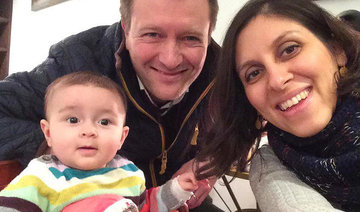LONDON: Iran’s ambassador in London should be made to go to the Foreign Office every day that British-Iranian Nazanin Zaghari-Ratcliffe remains incarcerated, a UK lawmaker said Tuesday.
Zaghari-Ratcliffe has been in jail for 800 days, having been sentenced to five years after she was accused of spying and plotting to overthrow the Iranian government.
Speaking in the House of Lords, the upper house of the UK Parliament, Lord Cormack asked why Foreign Secretary Boris Johnson “does not summon the Iranian ambassador to the Foreign Office every day until Mrs. Zaghari-Ratcliffe is released.”
Zaghari-Ratcliffe has always denied the charges against her and was denied temporary release to celebrate her daughter Gabriella’s fourth birthday on Monday. Instead, Gabriella had to spend her birthday in jail with her mother.
Supporters held a vigil on Monday outside the Foreign Office in London, lighting 800 candles for every day the 40-year-old charity worker has spent in prison.
Responding to Lord Cormack, Lord Ahmad of Wimbledon, a Foreign Office minister, said no opportunity was missed to raise the issue but that Zaghari-Ratcliffe’s continued incarceration was not the ambassador’s decision. “Those calls are made in Tehran,” he said.
“The situation in terms of human rights — and I speak as a human rights minister — is dire, not just for the people of other nationalities or indeed joint nationalities but for Iranians themselves.”
Iran does not recognize the concept of dual nationality — a fact which has caused immense problems for journalists working for the BBC’s Persian service, most of whom also hold dual nationality. This issue was also raised at the House of Lords on Tuesday.
Iranian authorities have launched a criminal investigation into the entire staff of 152 people working for the BBC Persian service, accusing them of crimes against national security.
Tehran has for years allegedly used blackmail and intimidation to harass both the BBC staff and their relatives and associates. The BBC said 20 families of its Persian service staff have received death threats over the past nine years and 86 family members have been called in for questioning by Iranian intelligence agents.
In a video compiled by the BBC, one journalist said her parents’ passports had been canceled, meaning they could not visit her in the UK and another said she was denied permission to see her dying father.
Another female journalist said Iranian agents had threatened to spread rumors about her sex life and disseminate pictures. They had also used the same tactic against men.
The BBC has appealed to the UN to intervene to stop the harassment.
Lord Ahmad on Tuesday told the House of Lords that many BBC staff and their families had suffered hardship because their assets had been frozen.
“We raised the issue before the United Nations Human Rights Council in March and several times with counterparts in the Iranian Foreign Ministry,” he said. “Alastair Burt, minister for Middle East, also raised it on April 29 and we continue to implore upon (sic) the Iranian authorities.”
The subject was introduced into the Lords’ debate on Tuesday by Lord Michael Grade, a former chairman of the BBC.
Twelve million people in Iran listen to the Persian service, which he said was a vital source of impartial news.
The continued targeting of BBC staff was “a very serious state of affairs,” said Lord Grade.
Lord Clarke of Hampstead asked what the British government was doing to ensure the BBC employees under investigation would receive better treatment than Zaghari-Ratcliffe.
Lord Ahmad said that “we are concerned about the charges and wider activities of the Iranian authorities toward the BBC staff and continue to raise it with them.”
The BBC did not respond to a request for comment on the debate.





















